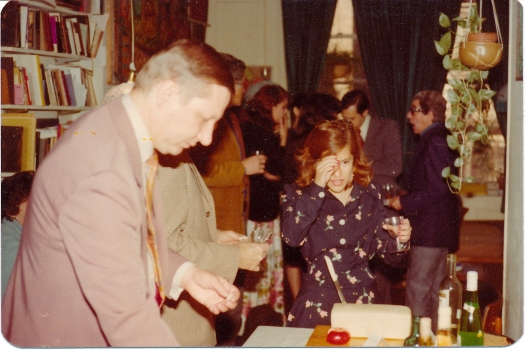— Hooper and Donna
He spoke orations like a stream full of bumping logs,
sported legal erudition like a Blackstone larynx,
brave head wrapped like a turban in precedential fog.
Called Hooper, he was a tall, luminous paragon of the law
whose humor hovered over a quiver-full of jokes.
like a lion advancing a congratulatory paw.
He cheerfully scattered about himself as though from the roof
vast pronouncements like three-winged eagles,
absentmindedly shot them down with a hyperextended spoof.
Till the day came he met Donna, whose exciting battle of words
had been played out up north
in the home of the Broadway Theatre Birds.
Now she came flopping home like kingdom come
to settle for what was at hand
with ample illusion left to strike us dumb.
Unfailingly she was, as ever, theatrical, airy,
playing life off the tips of disdainful fingers.
Squirt, squirt, distributing the goodies, like a perspicacious fairy,
dropping one over there, two over here, ploop! ploop!
“So be it! If you don’t like it, dearie,
send an Email to my chicken soup!”
She was constructed like the bay bridge, all distances and loops,
in the clothes she made herself freehand, shaping the cloth
in romantic, visionary, scissor swoops.
Her full-length opera cloak,
included the hunt, the hunters, a dozen dogs, the deer,
and coming from behind, athwart the smoke,
a trumpeter signaling their approach
by honking the hours to his horse
and welcoming them to an inn with an approaching coach.
She’d happily turn and show you the panorama.
As she perceived it, life was the fluttery
festive commedia of a swiftly revolving diorama.
Their meeting—(it did come)—was as though Blackbeard the Pirate,
pistoleros smoking, climbed aboard
some gold-laden galleon with his shrieking parrot.
Such explosions! They huffed, joked, laughed, circled, sang,
challenged one the other, like craziness,
each clanging the other as though the Liberty Bell had rung.
Who was the audience, who were the performers?
At length, spent, like blown-out Etnas and Krakatoas,
they fell asleep in separate terra firmas.
If Bonaparte had entered the room with Pitt the Younger, no doubt
they’d have quickly learned the rule. One or both must depart.
Two grand styles cancel each other out.
© Andrew Glaze 2015, from Overheard In A Drugstore
I have to confess that I never saw this poem until January of 2015. As soon as I read it I thought, “Wow, I remember that party!” It was either in the late 1960’s, or very early ‘70’s, and I had no idea my father had written a poem about it.
I’d love to tell you that I remember the real names of the people the poem is based on, but that information has long since left the building. “Hooper” had been to our home at least once before, was an interesting and entertaining man, loved to be in the spotlight, and knew how to hold his audience.
So I’m sure he was quite nonplussed by “Donna”, whose real name also escapes me. I think our party may have been the first time I met her. She sat in a chair in the living room and held court. And no, she wasn’t actually wearing a cloak with hunting dogs on it.
Between the pair of them, Donna won the living room territory. I remember initial moments when Hooper tried to interrupt Donna in her solo monologue, or start a dialog, but she artfully managed to evade him and disarm every attempt. Clearly this was not her first rodeo. Her theater background gave her an advantage he did not have, and it was like watching a fencing pro parry and slide her opponents sword to the ground.
In the end she completed her reign seated in the living room, and he retreated to the opposite end of the apartment to hold sway in the kitchen. In any case, “Hooper” was the very last guest to leave that night. I suppose that once “Donna” was gone he had the entire audience to himself once again and wished to linger in that glory. In any case, I still have a vision of my father saying “Goodbye, thanks for coming!” and then gently closing the door behind him. In relief, we all leaned back against the nearest wall, looked at each other, burst out laughing, and agreed that it had been one of the most exhausting parties we’d ever hosted as a family. It truly had been a battle of mega personalities.
Despite being shy, my father always loved parties, and hosted many of them in Manhattan. The collection of guests was varied, always interesting, and reflected my father’s circle of friends and supporters. At age 94, when he’d become hard of hearing, his memory was beginning to fail, and it was often difficult to know if he was sleeping in his armchair or simply closing his eyes, I remember telling him “Catherine, your niece, and her husband are joining us later to celebrate your birthday”. He immediately looked up, as excited as an 8 year old, and exclaimed, “A Party!?”
P.S. In the 1960’s and ’70’s, the term “Bohemian” referred to a Hippy/Gypsy approach to life and dress codes. It was the same when Puccini wrote his opera “La Boheme” about a group of starving artists in Paris. Nowadays we refer to “The BoHo look” in fashion, and it refers to the bohemian hippy styles of the ’60’s and 70’s. Although my father wore a bow tie to work everyday, we definitely lived a life that was more bohemian than most. Meanwhile, People involved in the theater, as “Donna” was, are still referred to as “Gypsies” in that world, because their lives are constantly changing as they move from one show to another or go on National or Regional tours. My father was referring to the trendy use of the word “Bohemia” rather than a geographic location. And, don’t forget that Manhattan is an island surrounded by oceans from the river. Large portions of the west side of the island, along the Hudson River, are made up of boat piers for ocean liners, shipping vessels, and naval frigates . So if you think in terms of Manhattan being a bohemian island of creative and artistic people, you could actually be “shipwrecked” along the coast of “bohemia”.

Photo by Adriana Glaze. Property of the Andrew Glaze Estate.
A photo of one of our typical parties:
Don Nelson is in the foreground. He was a theater critic for the New York Times and his wife Ricki Fulmer wrote for magazines like Cosmopolitan. Poet and writer Norman Rosten was in attendance off screen and his daughter Patty is standing facing the camera. UN diplomat Cesar Ortiz-Tinoco is on the right in the background, wearing glasses. He was the husband of poet, cookbook writer, and Gourmet Magazine contributor, Elizabeth Lambert Ortiz. She was also in attendance somewhere off screen.
—E. Glaze

The pastoral genre is not known for precise verisimilitude, and, like the assortment of mixed references to ancient religion and contemporary religious figures and customs, this possible inaccuracy may have been included to underscore the play’s fantastical and chimeric quality. As Andrew Gurr puts it, Bohemia may have been given a seacoast “to flout geographical realism, and to underline the unreality of place in the play”.
LikeLike
The reader also has to think of what the term “Bohemian” actually referenced in the 1960’s and ’70’s, which was a Hippy/Gypsy approach to life and dress codes. Nowadays we refer to “The BoHo look ” in fashion, and it refers to the bohemian hippy styles of the ’60’s and 70’s. Although my father wore a bow tie to work everyday, we definitely lived a life that was more bohemian than most. And people involved in the theater, as “Donna” was, are still referred to as “Gypsies” in that world, because their lives are constantly changing as they move from one show to another, or go on National or Regional tours. My father was referring to the trendy use of the word “Bohemia” rather than a geographic location. And, don’t forget that Manhattan is an island surrounded by oceans from the river. Large portions of the west side of the island, along the Hudson River, are made up of boat piers for ocean liners, shipping vessels, and naval frigates . So if you think in terms of Manhattan being a bohemian island of creative and artistic people, you could actually be “shipwrecked” along the coast of “bohemia”.
LikeLike